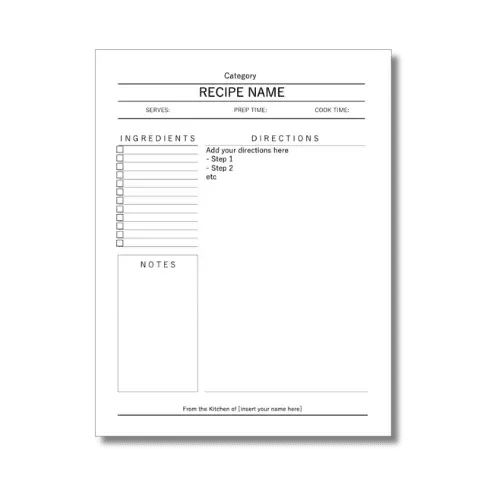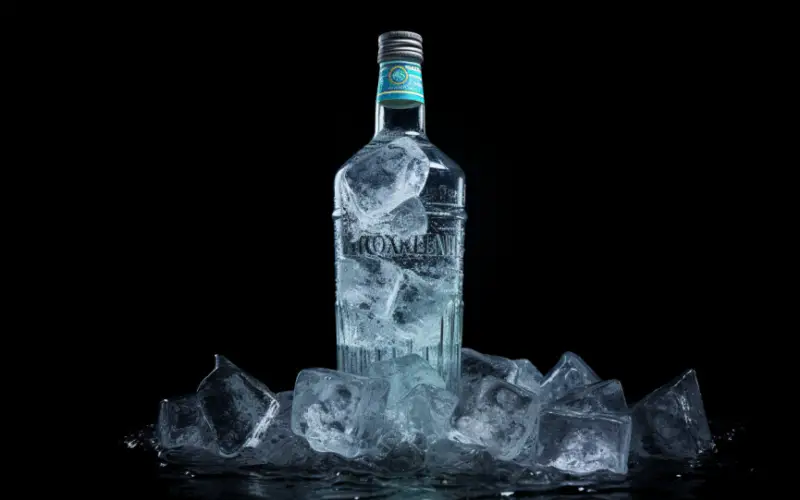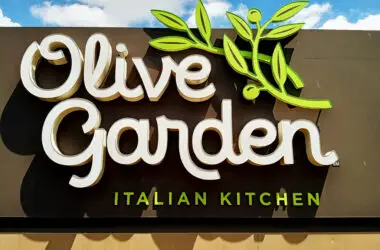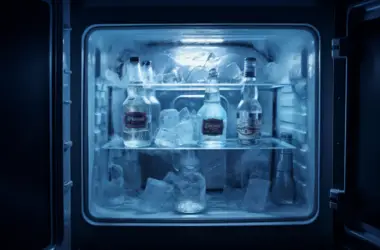Table of Contents Show
Vodka, a clear distilled alcoholic beverage with origins in Eastern Europe, is one of the most popular spirits worldwide.
Its smooth, clean taste makes it a versatile choice for cocktails, while its high alcohol content lends it a certain mystique.
One common question that arises when discussing vodka is, “Can vodka freeze?”
This guide aims to answer that question, delving into the science behind vodka’s freezing point, the factors that influence it, and the practical implications of this knowledge.
Vodka’s basic composition is water and ethanol, but the ratio of these two components can vary significantly, affecting the spirit’s freezing point.
The history of vodka is as rich and varied as the drink itself, with its roots tracing back to the 8th or 9th century in Russia and Poland.
Over time, vodka has evolved, and so have the misconceptions surrounding it, including its freezing point.
Understanding Vodka’s Freezing Point
The Science Behind Vodka’s Freezing Point
The freezing point of a substance is the temperature at which it changes from a liquid to a solid state. For water, this temperature is 0 degrees Celsius (32 degrees Fahrenheit). However, vodka, with its significant ethanol content, has a much lower freezing point. Ethanol freezes at -114 degrees Celsius (-173 degrees Fahrenheit), and since vodka is typically about 40% ethanol by volume, it won’t freeze until the temperature drops significantly below 0 degrees Celsius.
Factors That Influence Vodka’s Freezing Point
Alcohol Content
The alcohol content of vodka is a major factor that determines its freezing point. The higher the alcohol content, the lower the freezing point. This is because alcohol, specifically ethanol, has a lower freezing point than water. Therefore, a vodka with a higher alcohol content will require a lower temperature to freeze.
Impurities and Additives
Impurities and additives in vodka can also affect its freezing point. For instance, flavored vodkas may contain sugars or other additives that can raise the freezing point slightly.
Storage Conditions
The conditions in which vodka is stored can influence its freezing point as well. For example, if vodka is stored in a freezer, it may become more viscous or syrupy but won’t solidify unless the temperature is extremely low.
Common Myths About Vodka’s Freezing Point
There are several myths surrounding vodka’s freezing point. One common myth is that if vodka freezes, it’s not real or high-quality vodka. This is not necessarily true. While it’s correct that higher alcohol content lowers the freezing point, vodka can still freeze under extremely cold conditions, regardless of its quality or authenticity.
Practical Implications of Vodka’s Freezing Point
Vodka in Cocktails and Mixed Drinks
Understanding vodka’s freezing point can be useful when making cocktails or mixed drinks. Since vodka doesn’t freeze at the temperature of a typical home freezer, it can be used to create super-chilled drinks without the risk of the vodka turning into ice.
Vodka in Cooking and Baking
In cooking and baking, knowing that vodka has a lower freezing point than water can be beneficial. For instance, when making a pie crust, adding vodka can help keep the dough tender and flaky, as the alcohol prevents the formation of gluten and evaporates in the oven without leaving any alcohol taste behind.
Vodka as a Cold Serve Liquor
Vodka is often served chilled, and its low freezing point allows it to be stored in the freezer without freezing solid. This means you can always have cold vodka ready for serving without needing to chill it on the spot.
Vodka in Ice Cream and Other Frozen Desserts
Vodka can also be used in making ice cream and other frozen desserts. Because of its low freezing point, adding vodka to ice cream mix can help prevent large ice crystals from forming, resulting in a smoother texture.
Tips for Storing and Serving Vodka
Ideal Storage Conditions for Vodka
Vodka should be stored in a cool, dark place, away from direct sunlight. While it’s not necessary to store vodka in the freezer, doing so won’t harm the vodka and can ensure it’s always ready to serve chilled.
How to Serve Vodka at the Right Temperature
Vodka is best served chilled, but not too cold. If vodka is too cold, it can become viscous and the flavors can become muted. A temperature of -18 degrees Celsius (0 degrees Fahrenheit) is often recommended for serving vodka.
Proper Ways to Thaw Frozen Vodka
If your vodka does freeze, perhaps because it was stored in a commercial freezer with a temperature lower than its freezing point, don’t worry. Simply move the vodka to a warmer place and wait for it to thaw. The vodka will not be harmed by the freezing and thawing process.
Preventing Vodka from Freezing
If you want to prevent your vodka from freezing, simply ensure it’s not exposed to temperatures below its freezing point. For most vodkas, this means they can be safely stored in a home freezer.
Health and Safety Considerations of Vodka
Nutritional Profile of Vodka
Vodka is a low-calorie alcohol, with around 64 calories per 1-ounce serving. It contains no fat, carbohydrates, or sugars, which makes it one of the lower-calorie alcoholic beverages available.
Role of Vodka in Moderate Drinking
Like any alcoholic beverage, vodka should be consumed in moderation. The Centers for Disease Control and Prevention (CDC) defines moderate drinking as up to one drink per day for women and up to two drinks per day for men.
Vodka as a Source of Empty Calories
While vodka is low in calories compared to other alcoholic beverages, it’s important to remember that these are “empty” calories, meaning they provide no nutritional value. Drinking vodka in excess can contribute to weight gain and other health issues.
Vodka’s Impact on Weight Management and Overall Health
Excessive consumption of vodka, like any alcohol, can have negative effects on weight management and overall health. It can lead to weight gain, liver damage, and increased risk of various diseases. Therefore, it’s important to consume vodka responsibly.
Key Takeaways
Vodka, due to its high alcohol content, has a much lower freezing point than water. While it won’t freeze in a typical home freezer, it can freeze under extremely cold conditions. The freezing point of vodka can be influenced by its alcohol content, any impurities or additives, and the conditions in which it’s stored. Understanding vodka’s freezing point has practical implications for its use in cocktails, cooking, and serving. Like any alcoholic beverage, vodka should be consumed responsibly due to its caloric content and potential health impacts.
This guide was written by Eric, a multi-talented food blogger with over 12 years of experience in the field. Eric is passionate about helping people understand the science behind their food and drinks, and he hopes this guide has helped clarify the question, “Can vodka freeze?”






